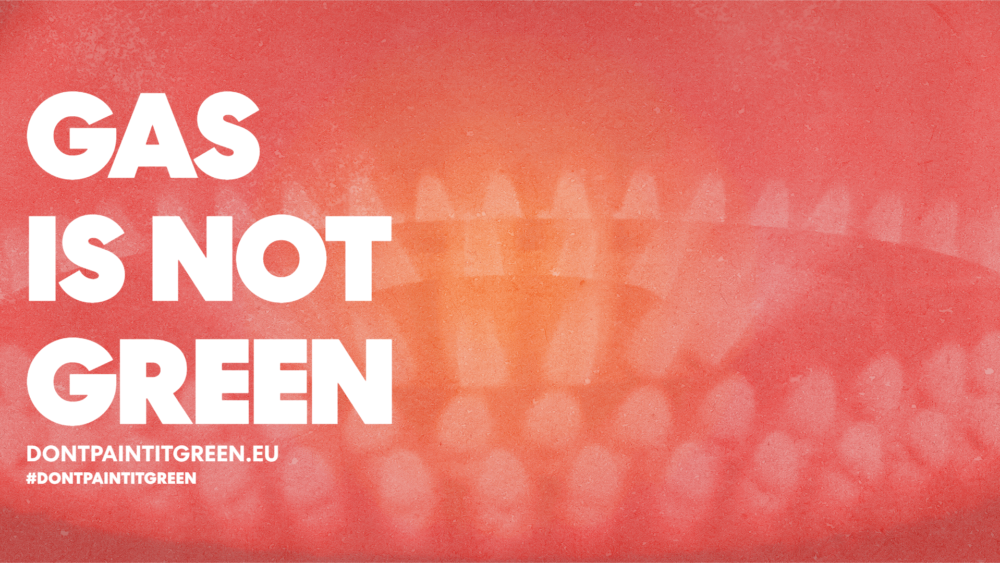The inclusion of gas in the EU sustainable investment taxonomy is incompatible with its own goal of net-zero emissions by 2050.
The European Union’s labelling of fossil gas as ‘sustainable’ undermines its own goal of net-zero emissions by 2050, goes against the advice from the Intergovernmental Panel on Climate Change and exposes households to energy shortages, rising costs of living and economic instability.
Any inclusion of fossil gas in the sustainable investment taxonomy will only serve to embed the status quo, rather than deliver the radical action that is needed to truly transform our economies, and the energy systems upon which they depend, and reach the critical goal of keeping global warming below 1.5 degrees.
Around 25 times more dangerous than carbon dioxide
Natural gas used for energy and heating is mostly methane, one of the most dangerous greenhouse gases that cause global warming – approximately 25 times more powerful than carbon dioxide when it comes to trapping heat in the atmosphere. While fossil gas emits less than coal in terms of the emissions caused per kilowatt hour of energy generated, it’s still one of the big three fossil fuels driving climate change that we need to stop using in order to cut emissions.
And that’s in a theoretical ‘best-case’ scenario. What these figures don’t take into account is the huge problem of ‘fugitive emissions’, which is the methane that escapes during the drilling, extraction and transportation process and is released into the atmosphere in its unrefined and most dangerous form. Even leakage of fugitive gas emissions at low levels has a huge impact on overall greenhouse gas emissions. Increasing the supply of fossil gas raises the risk of these unaccounted methane leaks, negating any possible justification for including gas as a sustainable investment.
The EU’s labelling of this dangerous greenhouse gas as ‘sustainable’ also goes against the advice from the Intergovernmental Panel on Climate Change, which has determined that methane emissions must be reduced by 35 percent between 2010 and 2050 in order to meet the Paris Climate Agreement goals. The inclusion of gas in the EU sustainable investment taxonomy therefore cannot be compatible with its own goal of net-zero emissions by 2050.
Greenwashing and red flags
Fossil gas has been listed in the taxonomy, along with nuclear, as a ‘transitional’ energy. Supposedly, while we’re waiting for technological advances and increases to scale before we can power the economy totally on wind and solar, we need more gas and nuclear to fill the gaps and help us to move away from coal.
While we do urgently need to replace the 13 percent of energy in Europe still produced by burning coal, more than 20 percent of the EU’s electricity is already produced from gas. Rather than directing financial flows towards renewables and energy efficiency that could result in deep emissions cuts, the inclusion of gas in the taxonomy will funnel more investments into fossil fuels. Considering these power plants operate for decades, this will perpetuate the status quo and result in a lock-in of emissions-intensive assets.
And the gas industry is celebrating. An oil and gas lobby group in Australia, which exports about 80 million tonnes of liquid natural gas each year, has already positioned this EU taxonomy as an opportunity to open up new gas exploration in order to contribute to ‘international decarbonisation.’ When the oil and gas lobby is excited about a new ‘sustainable investment’ criteria, this is a giant red flag that greenwashing is underway.
Political interests, security risks and higher prices
The taxonomy decision is not surprising considering the interests and politics of the EU’s power players. France runs almost 60 percent of its national energy grid on nuclear energy. Germany on the other hand has spent recent decades decommissioning plants to remove nuclear power from its energy mix, and was until recently looking forward to new imports of Russian gas via the controversial Nord Stream-2 pipeline to keep powering its energy-hungry industry. If France gets nuclear, then Germany gets gas, despite protest from less powerful European countries.
Increasing investments in gas poses a major risk to Europe’s energy security. The recent invasion of Ukraine and the associated sanctions demonstrate the danger of Europe relying so heavily on gas as an energy source. Despite its stance on the new Nord-Stream 2 project, the EU has not suspended the import of gas from existing Russian pipelines – which in 2019 accounted for 41 percent of all natural gas imported into the EU. So, even now as Russia wages war in the Ukraine and the EU makes strongly-worded statements and implements economic sanctions, Russian gas is still powering German factories.
As the conflict with Russia continues in Europe, EU countries dependent on gas may face energy shortages, which will push up the cost of heating and powering homes, and of everyday goods, the impact of which will ultimately fall on households. This inflation caused by increases in energy prices may risk pushing EU national economies back into recession, increasing unemployment and potentially unleashing a new wave of austerity measures that will further hit everyday people.
Powering a truly sustainable future
The EU needs to take a bolder approach to the sustainable investment taxonomy, making polluting and emitting businesses unprofitable while driving investment into renewables and energy efficiency. The EU must also reclaim ecological transition as the responsibility of the government, rather than the private sector, and release the funds that are needed to drive the transformation to a low-carbon and low-polluting economy via green bonds and green public works, as outlined in DiEM25’s Green New Deal for Europe.
Finally, we must question the paradigm of endless and exponential economic expansion upon which the sustainable investment and ‘green growth’ narrative is based. Despite decades of rhetoric around circularity, energy efficiency and dematerialisation, global carbon emissions continue to rise. We have simply not seen the evidence that we can ‘decouple’ GDP growth from carbon emissions, natural resource use, pollution and biodiversity loss.
Without systemic and structural economic change, even the best advancements in energy efficiency and renewable energy can only do so much to prevent catastrophic global warming. If global GDP were to grow year on year at three per cent indefinitely, the amount of energy needed to power the economy would also rise exponentially, keeping us perpetually on the hamster wheel of trying to increase energy supply while keeping emissions down.
The internal logic of the capitalist system means the economy must grow for the sake of growing, or else collapse. So we are compelled to produce and consume more and more products and services, without consideration of their value or purpose, nor of their impact on people and the planet. Whether powered by gas, nuclear or renewables, endless GDP growth has a negligible benefit on actually improving the lives of people, instead flowing to the already wealthy and increasing inequality.
Reconceptualising energy as a public good and a fundamental right, and bringing sustainable finance and investment under democratic control, would ensure that economic activity is actually being undertaken for the long-term benefit of people, and not for the short-term profits of private investors.
We must take this opportunity not only to reject the labelling of gas as a ‘sustainable’ investment, but to rethink entirely our economic metrics and reorient our economic systems towards low-emitting, socially-valuable activity that provides decent jobs and real development outcomes, rather than adding more zeros to the bank accounts of the extremely wealthy.
Add your name to the petition calling on European Members of Parliament to vote down the inclusion of gas as ‘sustainable’ and demand that they Don’t Paint it Green!
Do you want to be informed of DiEM25's actions? Sign up here















